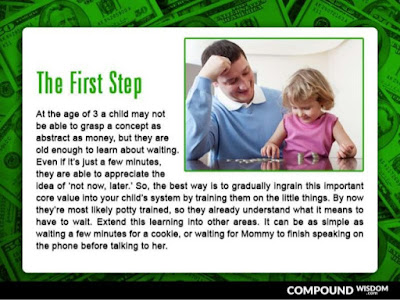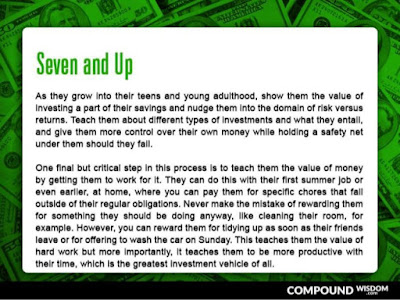Teach your child about investing
Teach your child about investing
The First Step
At the age of 3, a child might not be able to grasp a concept
as abstract as money, but they are old enough to learn about waiting.
Even if it's just a few minutes,
they are able to appreciate the idea of 'not now' 'later'.
So, the best way is to gradually ingrain this important core value into
your child's system by training them on the little things.
By now they are most likely potty trained,
so they already understand what it means to have to wait.
Extend this learning to other areas. It can be as simple as waiting a few minutes
for a cookie, or waiting for Mommy to finish speaking on the phone before talking to her.
Teach your child about investing
The First Step
Let your child tell you how fast or how slow you should be going,
and try to make the process fun.
It's also vital to make sure that you reward them appropriately for achieving the goal.
If your cookie-loving toddler has put her share of sheer mental effort to wait
five minutes before diving into her chocolate chip treat, give her two!
Do that a few times and she'll inevitably come to the conclusion that 'waiting equals good'
There's your first lesson in investing!
Teach your child about investing
The Money Train
Training your little one to understand the concept of money is not really that hard.
Even as early as 4 they already know how to count, so use that as an incentive
for them to learn.
You can even use play or real money to show them how to count out change or break a dollar.
Let them watch you spend money to buy things at the store - of course,
you'll have to use cash at these times.
Teach your child about investing
The Money Train
Over time, they will begin to understand that things can be 'exchanged' for money,
and you'll start to see them use this in their play as well.
Let them hear you use phrases such as "how much is it?"
or "Here's a twenty" or "Can you break a hundred?"
Be sure to let them handle real money in your presence, and teach them the names
of different denominations of coins and paper money.
You'll be surprised at how much your precious baby can learn just by watching and listening.
Teach your child about investing
High Five
By the age of five your child is ready to learn about self-control and decision-making.
At this age, peer-pressure starts to show up unexpectedly-mostly at school.
Show them how to deal with by putting them into real-life scenarios.
For example, if they ask for candy at the store,
tell them to choose one out of a number of favorites.
This will teach them about making decisions and giving up something
in favor for another.
Teach your child about investing
High Five
This is the right time to introduce them to money as a tool or device that can be used
to acquire their equivalent value in goods and services.
This is also the right time to start them on their weekly allowance and show them
the best way to spend or save it.
Things like saving up for that really cool toy or putting their money
into your savings account and showing them on the account statement where
their money is are great ways to move from a physical to an abstract
understanding of more and it's role.
Teach your child about investing
Seven and Up
Beyond the age of 7, you can be gradually introduce them to basic accounting.
Keep it simple: cash in, cash out.
Show them how to record individual expenses from their allowance
and tally it up at the end of the week/
At this age, you can hold them accountable to their money and how they use it.
Remember to always make it interesting and fun so they really get involved
in the whole process.
Teach your child about investing
Seven and Up
As they grow older, you can talk to them about the stock market,
how stock is valued, the appreciation of investment over time and so on.
By now they are ready to enter the world of grown-up decision making,
so if you think you are ready, assign a small part of your stock portfolio under their control
and ask them to monitor its performance over time.
All of these exercises will give them a sense of familiarity with money
that will serve them throughout their lives.
Teach your child about investing
Seven and Up
As they grow into their teens and young adulthood, show them the value
of investing a part of their savings and judge them into the domain of risk versus returns.
Teach them about different types of investments and what they entall,
and give them more control over their own money while holding a safety net
under them should they fall.
One final but critical step in this process is to teach them the value of money
by getting them to work for it. They can do this with their first summer job or
even earlier, at home, where you can pay them for specific chores
that fall outside their regular obligations.
Never make the mistake of rewarding them for something they should be
doing anyway, like cleaning their room, for example.
However, you can reward them for tidying up as soon as their friends leave
or for offering to wash the car on Sunday.
This teaches them the value of hard work but more importantly,
it teaches them to be more productive with their time,
which is the greatest investment vehicle of all.
Teach your child about investing> www.compoundwisdom.com
"If you are a learner or naturally new to something,
and you now find someone who is stronger
and more knowledgeable than you,
cling and hold on to that person
You will get to where you are going faster
Likewise we should apply this principle with God
Be satisfied to know the ONE who knows
even if you don't know"
-DamieQ
We are God's Perfect Creation
Beautiful of all worlds.
DamieQuotes













Comments
Post a Comment